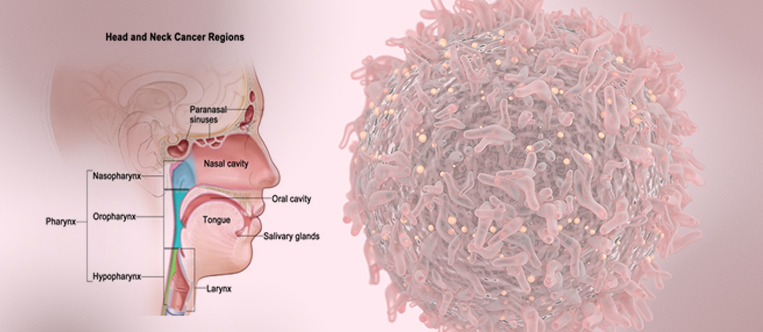Head and neck cancers normally start in the squamous cells inside the head and neck as inside the mouth(oral cavity), nasal cavity (behind the nose), paranasal sinuses(around the nose), salivary glands(salvia making glands) throat(pharynx) and voice box(larynx). Dr Nishant Sanghvi is one of the top head neck cancer doctor in Ahmedabad, head and neck cancer surgeon in Gujarat.

Translate In Your Language
Head & Neck Oncology
Dr Nishant Sanghvi - Head and Neck Cancer Surgeon in Ahmedabad, Gujarat, Rajasthan
top head neck cancer doctor in gujarat, top head neck cancer doctor in ahmedabad, head and neck cancer Hospital in ahmedabad, head and neck cancer surgeon in ahmedabad, head and neck cancer surgeon in gujarat
SYMPTOMS OR SIGNS
- Lump or sore, which does not heal
- Oral cavity - White or red patches on gums, tongue or lining of the mouth. Swelling of the jaw, unusual bleeding or pain in the mouth.
- Pharynx - Pain when swallowing, pain in neck or throat, which does not go away with frequent headaches, pain or ringing in ears.
- Larynx - Swallowing pain or ear pain.
- Paranasal sinuses and nasal cavity - Sinuses infections which do not respond with antibiotics, selling or other problems with eyes or denture.
- Salivary glands - Swelling under the chin, numbness or paralysis of face muscle, chin or neck which does not go away.
- Difficulty in chewing, swallowing ,moving jaws or tongue.
REASONS FOR HEAD AND NECK CENCER
Most of the cases of Head and neck cancer in India comes in existence in the form of mouth and oral cancer. Major reasons are:
- Tobacco consumption in the form of jarda, guthka, different forms of smokeless tobacco, betel nut with or without paan.
- A habit of keeping tobacco quid against check and gums, it leads to cancer of gums, cheeks, and inner cheeks.
- Alcohol
- Tobacco chewing
- Cigarette, bidi and cigar smoking
- Exposure to textile fibers
- Poor dental and oral hygiene.
HEAD AND NECK CANCER (ONCOLOGY)
The overall focus is to improve patient’s quality of life and preserving functions such as swallowing, speech, taste, and hearing. If these cancers are diagnosed early they are treatable.
Radiation can be added with surgery if other risk factors of cancer are identified.
- Advanced cancers which involve adjoining structures or spread to lymph glands in the neck then surgery with the combination of radiation and chemotherapy is recommended.
- In very advanced cancer cases when it has spread near the brain or spread to other parts of the body. At this stage quality of life can be improved with palliative radiation therapy with chemotherapy and immunotherapy.
Surgery: If the surgery becomes an ultimate option for a patient, the whole tumor and the lymph nodes are removed. Depends on the affected area, a wide excision take place in some cases as a rim or segment of the jaw. At Zanish head and neck cancer hospital we are equipped with advanced minimally invasive endoscopic instrumentation laser with a microscope for vocal cord surgery. Dr Nishant Sanghvi is specialist of head and neck cancer doctor in Ahmedabad, Gujarat.
Radiation Therapy: Radiation therapy is the entail use of high energy X-ray to kill cancer cells. Source of radiation may be from a machine outside the body (external beam radiotherapy) or radioactive materials inserted into the affective organ.
Chemo-Radiation: Many of the cases of H&N cancer demands combination of chemotherapy and radiation. These therapies improve the cure rates and conserve the organ affected by the disease. Combination of these therapies may increase the chance of normal speech and swallow.
Chemotherapy: On the basis of individual needs and suitability H& N cancer requires chemotherapy and biological therapy. Generally, a combination of drugs is used. The oncologist also decides the therapy plan as per the individual case.
Chemotherapy may be combined as:
- Neoadjuvant chemotherapy – prior to definitive treatment (surgery)
- Adjuvant chemotherapy – following surgery
- Chemo-radiotherapy – with radiotherapy
- Palliative chemotherapy – in the advanced setting
Chemotherapy works to:
- Decrease the chances of recurrence following surgery
- Shrink cancer before surgery if it is large to downstage the cancer
- Control the disease when it has spread to the other areas of the body




